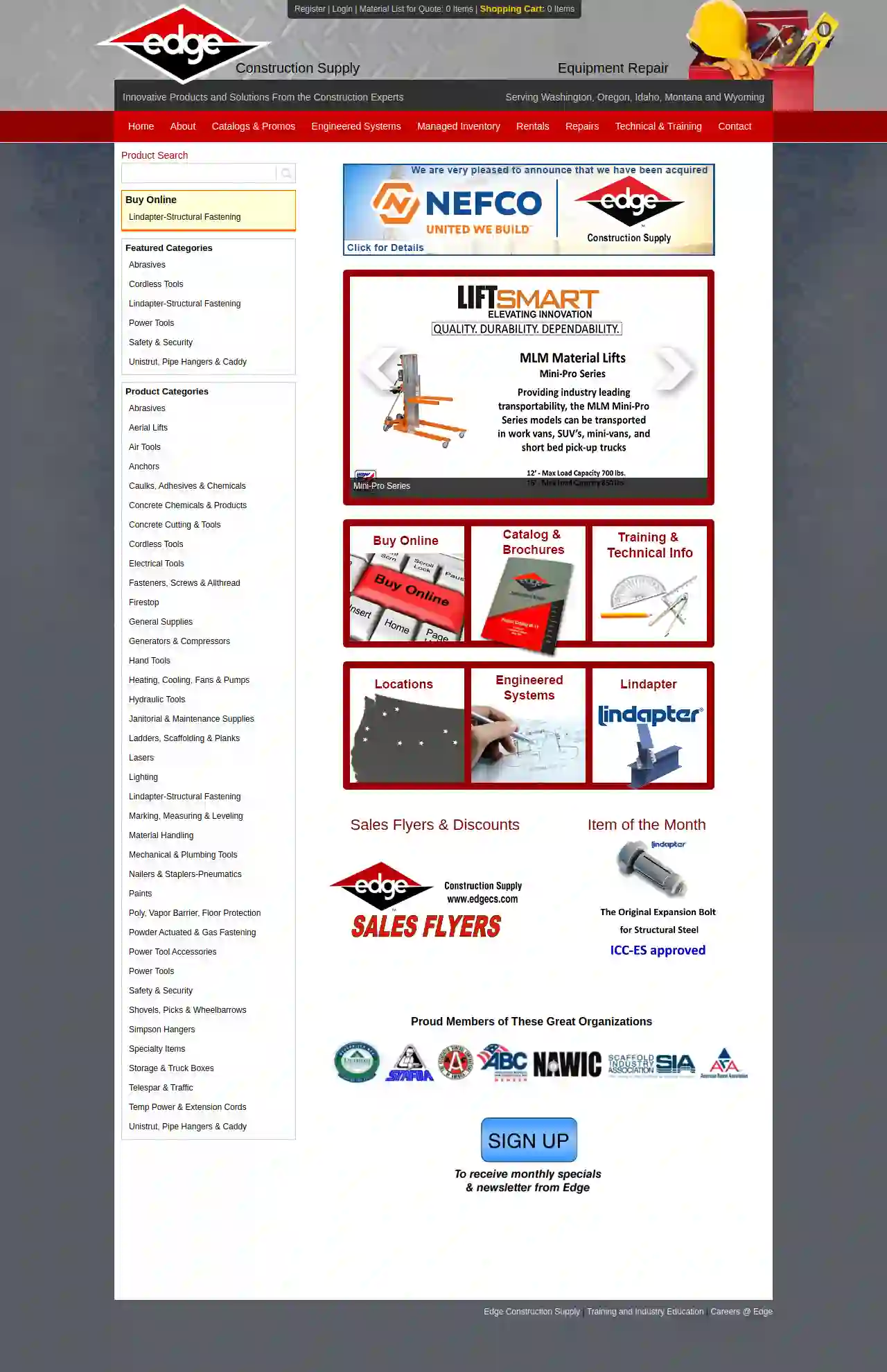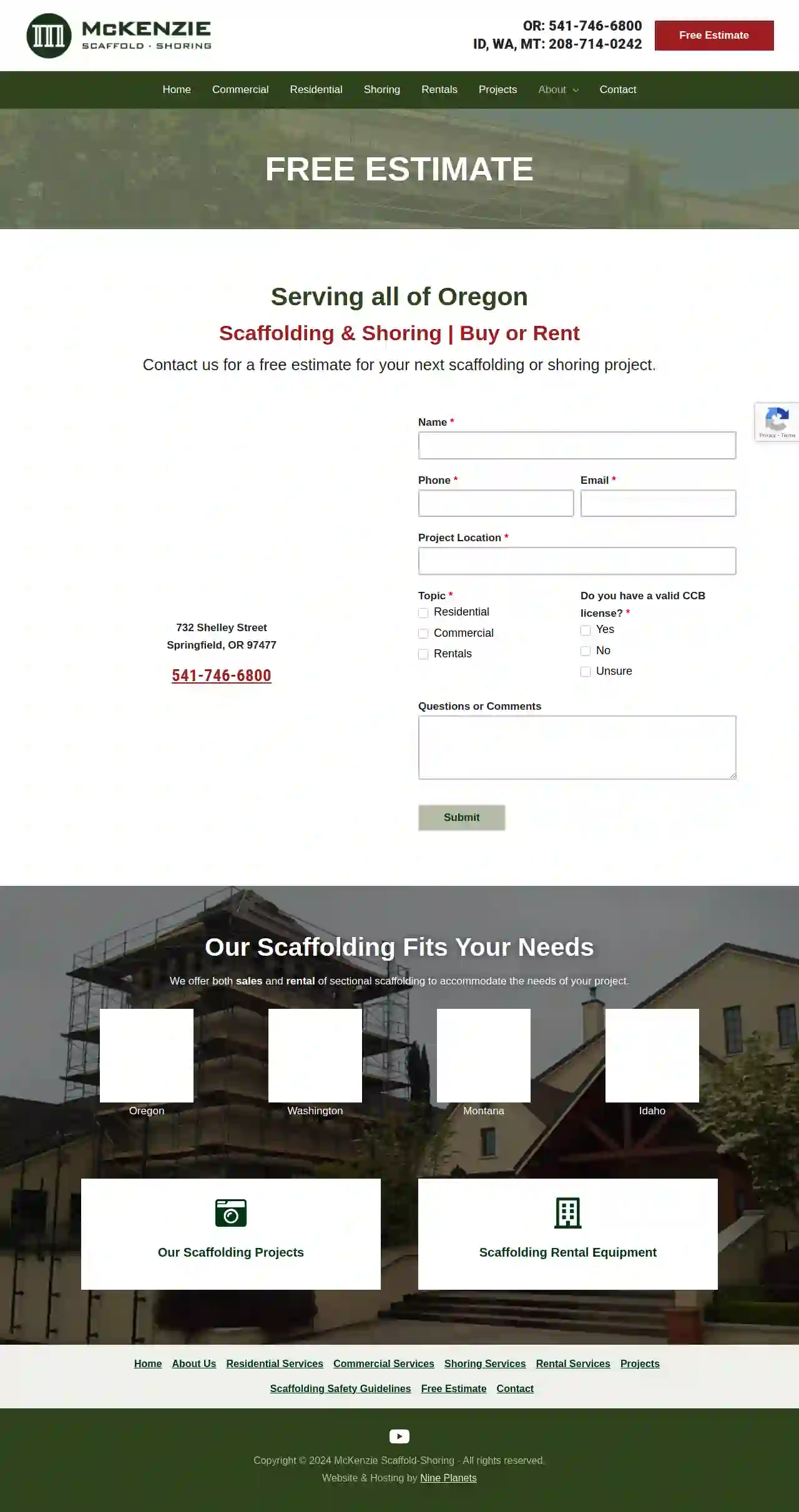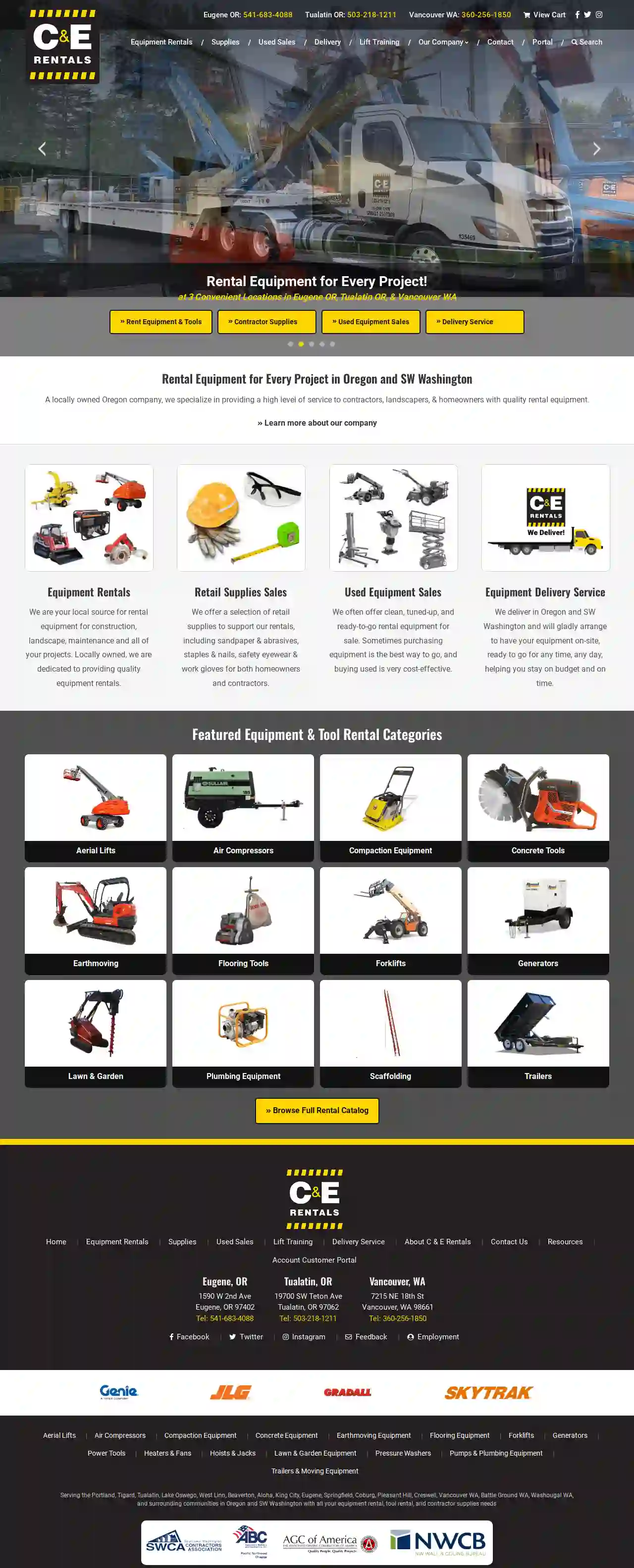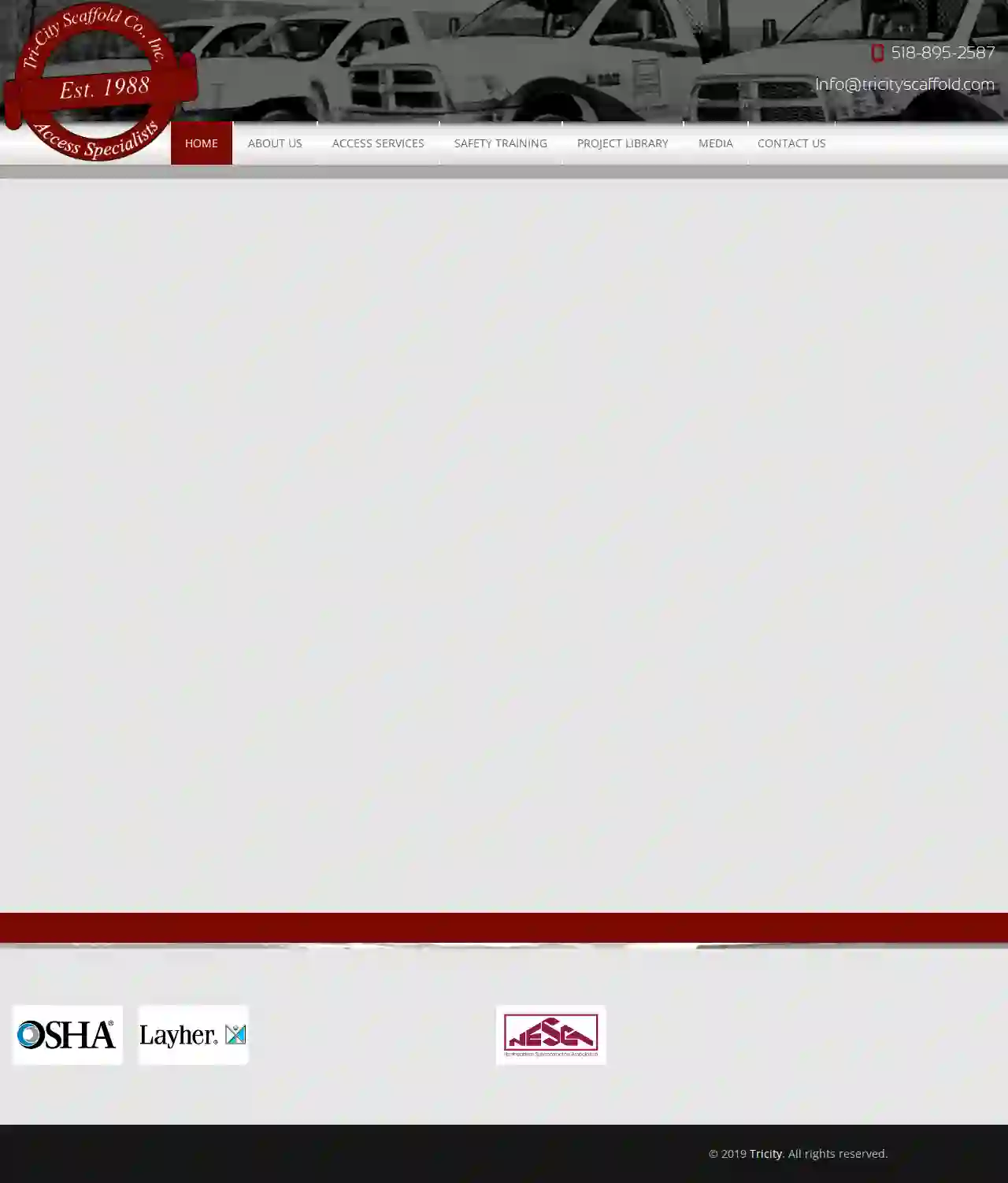Scaffolding Companies Sutherlin
Find the best Scaffolding Experts in Sutherlin
Get multiple Scaffold Services quotes for your project today! Compare profiles, reviews, accreditations, portfolio, etc... and choose the best service.

Edge Construction Supply
4.830 reviews123 Main St, Spokane, WA, 99201, USEdge Construction Supply has been serving the commercial construction and industrial markets for more than 70 years. We are headquartered in Spokane with eight additional branches including Seattle, Yakima, Kennewick, Boise, Eugene, Medford, Billings, and Idaho Falls. We proudly service our customers in Washington, Oregon, Idaho, and Montana. Our company has been built upon relationships with our customers. We provide expert service for your project and we aim to serve.
- Services
- Why Us?
- Accreditations
- Our Team
- Testimonials
- Gallery
Get Quote
McKenzie Scaffold-Shoring
3.97 reviewsSpringfield, OR, 732 Shelley Street, 97477, USMcKenzie Scaffold • Shoring is a premier provider of scaffolding and shoring services, serving all of Oregon, Idaho, along with Eastern Washington and Western Montana. The company offers both sales and rental of sectional scaffolding to accommodate the needs of your project, ensuring outstanding safety performance, on-time and on-budget project management.
- Services
- Why Us?
- Accreditations
- Gallery
Get Quote
C & E Rentals
4.4144 reviews1590 W 2nd Ave, Eugene, 97402, USRental Equipment for Every Project in Oregon and SW Washington A locally owned Oregon company, we specialize in providing a high level of service to contractors, landscapers, & homeowners with quality rental equipment. Learn more about our company Equipment Rentals We are your local source for rental equipment for construction, landscape, maintenance and all of your projects. Locally owned, we are dedicated to providing quality equipment rentals. Retail Supplies Sales We offer a selection of retail supplies to support our rentals, including sandpaper & abrasives, staples & nails, safety eyewear & work gloves for both homeowners and contractors. Used Equipment Sales We often offer clean, tuned-up, and ready-to-go rental equipment for sale. Sometimes purchasing equipment is the best way to go, and buying used is very cost-effective. Equipment Delivery Service We deliver in Oregon and SW Washington and will gladly arrange to have your equipment on-site, ready to go for any time, any day, helping you stay on budget and on time.
- Services
- Why Us?
- Gallery
Get Quote
BrandSafway Services Albany
47 reviewsAlbany, US- Services
- Why Us?
Get Quote
Performance Equipment Rental
Newburgh, NY, 5301 Route 9W, 12550, USPerformance Equipment Rental LLC is a powerful architecture and construction theme that offers a wide range of equipment for rent. With branches in New York and New Hampshire, they provide top-notch services to clients across the region. Their mission is to provide high-quality equipment and exceptional customer service.
- Services
- Why Us?
- Accreditations
- Our Team
- Testimonials
- Gallery
Get Quote
Tri-City Scaffold Co., Inc.
Delanson, NY, 282 Pannis Road, 12053, USTri-City Scaffold Co., Inc. is a family owned premier scaffolding company with a leading reputation for providing high quality and safe access solutions across the capital region and Upstate New York. Established in 1988, Tri-City Scaffold has consistently delivered expertise in access solutions across a wide range of industries meeting the needs of unique and complex projects spanning: institutional, industrial, civic, commercial, private, and government sectors. Experience, competence, and technical proficiency combined with an outstanding best practice compliance and safety record, ensures that our team of professional scaffolders persistently deliver superior results with maximum safety management. Tri-City’s unrivaled professional team of scaffold builders are the backbone of the company, with an impressive number employed at Tri-City for 14 years or more, as well as a new generation of builders that continue to cement the leading reputation of Tri-City Scaffold with every project.
- Services
- Why Us?
- Accreditations
- Our Team
- Testimonials
- Gallery
Get Quote- La
Law's Tru Stone LLC
4.228 reviewsBend, US- Services
- Why Us?
Get Quote - Un
United Rentals
4.125 reviewsEugene, US- Services
- Why Us?
Get Quote - Mi
Michiana Rental
4.3177 reviewsBend, US- Services
- Why Us?
Get Quote - Gl
Glass Doctor of South Bend, IN
4.6147 reviewsBend, US- Services
- Why Us?
Get Quote
Over 2,353+ Scaffolding Contractors registered
Our scaffolding companies operate in Sutherlin and beyond!
ScaffoldingHQ has curated and vetted Top Scaffolding Businesses in Sutherlin. Find a trustworthy contractor today.
Frequently Asked Questions About Scaffolding Companies
- Encroaches onto public property (sidewalks, roads): Permits are usually needed from the local council or highway authority.
- Exceeds a certain height: Scaffolding above a specified height often requires a permit.
- Is erected in a conservation area or near a listed building: Special considerations and permits may apply.
- Falls from Height: The most significant risk, often due to lack of guardrails, improper use of safety harnesses, or unstable platforms.
- Falling Objects: Tools, materials, or debris falling from the scaffolding can injure workers or people below.
- Scaffold Collapse: Improper assembly, overloading, or inadequate foundation support can lead to a catastrophic collapse.
- Electrocution: Contact with overhead power lines is a serious hazard when working near electrical infrastructure.
- Slips, Trips, and Falls: Wet or cluttered platforms, uneven surfaces, and loose debris can cause falls.
- Mobile Elevated Work Platforms (MEWPs): Scissor lifts, boom lifts, and other MEWPs offer flexible access for specific tasks.
- Mast Climbing Work Platforms (MCWPs): Ideal for high-rise construction, providing a stable working platform that can be raised incrementally.
- Suspended Access Equipment: Ropes and harnesses used for specific tasks like window cleaning or façade repairs.
- Ladders and Step Ladders: For shorter durations and limited working heights, provided they are used safely and appropriately.
- Always Wear a Safety Harness: Connect your harness to a secure anchor point at all times to prevent falls.
- Keep Platforms Clear: Remove tools, materials, and debris to avoid tripping hazards.
- Never Overload the Scaffolding: Stay within the designated weight limits.
- Be Aware of Your Surroundings: Pay attention to power lines, moving equipment, and other potential hazards.
- Inspect Before Use: Check the scaffolding for any damage or defects before starting work.
- Communicate Clearly: Use hand signals and clear communication to coordinate with other workers.
- Follow Safety Training: Attend and understand all safety training provided by your employer or the scaffolding company.
Do I need a permit for scaffolding in the USA?
What are some common scaffolding safety hazards?
What are some alternatives to traditional scaffolding?
What are some tips for working safely on scaffolding?
Do I need a permit for scaffolding in the USA?
- Encroaches onto public property (sidewalks, roads): Permits are usually needed from the local council or highway authority.
- Exceeds a certain height: Scaffolding above a specified height often requires a permit.
- Is erected in a conservation area or near a listed building: Special considerations and permits may apply.
What are some common scaffolding safety hazards?
- Falls from Height: The most significant risk, often due to lack of guardrails, improper use of safety harnesses, or unstable platforms.
- Falling Objects: Tools, materials, or debris falling from the scaffolding can injure workers or people below.
- Scaffold Collapse: Improper assembly, overloading, or inadequate foundation support can lead to a catastrophic collapse.
- Electrocution: Contact with overhead power lines is a serious hazard when working near electrical infrastructure.
- Slips, Trips, and Falls: Wet or cluttered platforms, uneven surfaces, and loose debris can cause falls.
What are some alternatives to traditional scaffolding?
- Mobile Elevated Work Platforms (MEWPs): Scissor lifts, boom lifts, and other MEWPs offer flexible access for specific tasks.
- Mast Climbing Work Platforms (MCWPs): Ideal for high-rise construction, providing a stable working platform that can be raised incrementally.
- Suspended Access Equipment: Ropes and harnesses used for specific tasks like window cleaning or façade repairs.
- Ladders and Step Ladders: For shorter durations and limited working heights, provided they are used safely and appropriately.
What are some tips for working safely on scaffolding?
- Always Wear a Safety Harness: Connect your harness to a secure anchor point at all times to prevent falls.
- Keep Platforms Clear: Remove tools, materials, and debris to avoid tripping hazards.
- Never Overload the Scaffolding: Stay within the designated weight limits.
- Be Aware of Your Surroundings: Pay attention to power lines, moving equipment, and other potential hazards.
- Inspect Before Use: Check the scaffolding for any damage or defects before starting work.
- Communicate Clearly: Use hand signals and clear communication to coordinate with other workers.
- Follow Safety Training: Attend and understand all safety training provided by your employer or the scaffolding company.